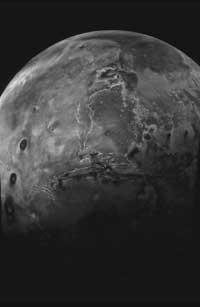Speaking of space
1997/01/01 Elhuyar Zientzia Iturria: Elhuyar aldizkaria
The efforts made in the early days of the investigation of the outer space that surrounds us and the project of transferring man to the Moon are one of those challenges that are justified in a natural way. Later, thanks to the proper force of science for its development, it began to work on the knowledge of Venus, Mercury and Martitz, first sent the spaces that orbited those planets and then it was the turn of those who landed both on Venus and on Mars.
These opened the way to other objectives: on the one hand, giving room to the idea of bringing man to Mars and, on the other, setting in motion the spaces that Jupiter and other outer planets would analyze closely. This last objective was perfectly fulfilled by the Voyager probes and, once they have already given their best, they go out of the orbit of Pluto moving away forever. Following the study scheme of the inner planets, a year has passed since the module released from the Galileo probe plunged into the atmosphere of Jupiter.

Experts in the atmospheric dynamics of this planet believed that water vapour would be found, but the results have not met expectations: water has hardly been found in the atmosphere of Jupiter. It is curious because it has finally been found in unexpected places. Or perhaps we should say that when water has been found outside the Earth in recent months, the press has diffused the findings too much, hopefully or not to find them.
The prediction of the presence of oxygen in Ganimedes last November has not generated surprise among the experts, since last year it was found in Europe (another satellite of Jupiter). Ganimedes ice is the oxygen released by the frozen water molecules that have been broken by the attacks of cosmic rays, meteorites, etc. In the fine atmosphere of Ganymedes (the pressure it generates is a million times lower than that we have on Earth). Therefore, this oxygen is not related to any life-related process, as is underlined in all information. Why so much publicity and that allusion to extraterrestrial life?
The US Ombudsman has recently published that in a crater of the southern pole of the Moon there is also an ice lake. The highlight of the news is that it would greatly facilitate the construction of a permanent colony on the Moon. And all when a group of NASA researchers have announced on Mars that there is or has existed a life and wants to date a possible project to take man to Mars.
As the need for projects around the “war of galaxies” has disappeared, NASA and RKA (Russian Space Agency) have suffered a continuous decline in their budgets (in the case of RKA, for other reasons we all know). The mere recognition of Saturn or the fact that man sees himself on Mars, having long seen him on the Moon, are not goals that have strength. For this reason, scientists are pursuing one of those projects that is justified by themselves, so that the funds are no longer closed.
One of these projects could be the search for possible signs of life in the Solar System, leading man back to the Moon and Mars. Some believe that the finding of the slightest trace that would fully confirm the existence or existence of life outside the Earth would provoke the cultural revolution that implied the abandonment of geocentrism in its day or the approval of the theory of evolution.
In my opinion, the consequences of having to promote these ideas are, along with the prediction that oxygen has been found in Ganimedes, making allusions to extraterrestrial life that do not come to the account or relate the importance of water that has been found on the Moon with a possible sustainable colony. In spite of everything, at the end of the year, two ships were launched to land on Mars. There is no doubt that next summer there will be many news of interest when these spaces arrive.

Gai honi buruzko eduki gehiago
Elhuyarrek garatutako teknologia






